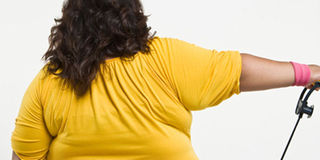Prime
Ask the Doctor: Does being overweight affect your birth control?

What you need to know:
Obese women are more prone to blood clots, cancer of the womb (endometrial cancer), and endometrial hyperplasia and as such benefit most from IUCD (coil) instead of contraceptive hormones which increase the risks of the said problems
I weigh more than 100kgs and I am looking for a safe family planning method to use. I have been told I cannot use a coil because of my weight. What can I use?
Spongina
Dear Spongina,
In Uganda, the most used Intra-Uterine Contraceptive device (IUCD or coil) is the “copper T”, a small plastic device wrapped with a copper wire which is inserted in the womb and is highly effective (99 per cent) as a contraceptive. The “copper T” may be effective for up to 10 years. The womb is never too big to carry the device and the one per cent failure is not due to a spacious womb but other reasons including expulsion of the device.
The device works by “emitting” copper, which makes the inner lining of the womb unsuitable for a fertilized egg to implant apart from copper being toxic to both the egg and sperm.
It is not true that the more obese a woman is the more spacious the womb. Even if for any reason the womb was spacious, the copper will reach every corner hence ably preventing pregnancy even in spacious wombs unlike the original coil shaped devices used in the past. Being obese can only affect insertion of the coil making it difficult to locate the cervix apart from difficulty in determining the cavity direction of the womb which can be solved by using an ultrasound.
Obese women are more prone to blood clots, cancer of the womb (endometrial cancer), and endometrial hyperplasia and as such benefit most from IUCD (coil) instead of contraceptive hormones which increase the risks of the said problems.
Though much maligned and less used by Ugandan women, the device can be used by all women including teenagers. It is not true that the IUD leads to ectopic pregnancy because overall pregnancies are prevented by 99 per cent.
That said, it is important to consult a family planning specialist for advice before embarking on family planning, especially now that you fear using an IUCD.
A woman will have an increased risk of unintended pregnancy if her IUD spontaneously falls out or becomes displaced. If expulsion occurs, the woman is not protected against pregnancy. One is advised to feel for the strings of a newly inserted coil so that they are able to check for its presence after every period.
Unusual vaginal discharge, cramping or pain, spotting between periods after sex bleeding or even spotting, painful sex or the absence or lengthening of the strings can be signs of a possible displacement or expulsion.




